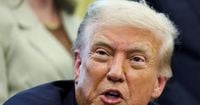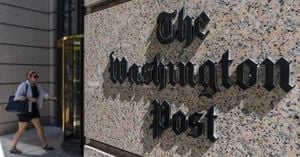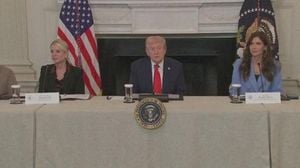The U.S. federal deficit is ballooning at a pace that has policymakers, economists, and ordinary citizens alike wondering how – or if – the country can get its fiscal house in order. As of September 2025, the federal budget deficit has surged to $1.97 trillion for the current fiscal year, putting the nation on track for its largest shortfall outside of extraordinary crisis periods, according to Seeking Alpha. Meanwhile, a record $165.2 billion in customs duties has poured into government coffers, thanks to a spike in tariffs that is reshaping the landscape of U.S. fiscal policy.
This sharp rise in the deficit isn’t just a blip. It’s the latest chapter in a decades-long story of growing government red ink, driven largely by surging spending on entitlement programs like Social Security, Medicare, and Medicaid. As Reuters reports, these so-called entitlements have become the biggest driver of federal outlays as a percentage of gross domestic product (GDP), far outpacing discretionary spending on defense or even the swelling interest payments on government debt.
On the revenue side, the picture is equally complex. Tax collection remains the government’s primary income source, but the burden is not shared equally. In 2024, individual taxes accounted for 8.4% of GDP, while corporate taxes made up just 1.8%, according to data from the Congressional Budget Office (CBO) cited by Reuters. That gap is no accident. Over the past 40 years, federal corporate tax rates have tumbled by 25 percentage points, while individual tax rates have held steady. The upshot? The government is collecting proportionally less from businesses, even as spending continues to climb.
It’s not just taxes that have shifted in corporate America’s favor. Interest rates have steadily declined from the 1980s through 2022, making it cheaper for companies to borrow and invest. According to a Federal Reserve paper highlighted by Reuters, the combination of lower interest expenses and falling corporate tax rates accounts for more than 40% of the real growth in corporate profits from 1989 to 2019. In short, U.S. businesses have enjoyed a significant tailwind from government policy for decades.
But now, with deficits swelling and traditional tax hikes politically toxic, the government is experimenting with new ways to boost revenue – and some of them are raising eyebrows. For example, the Trump administration has pursued what some analysts describe as “stealth taxes,” including not only increased tariffs but also taking equity stakes in certain companies. This unconventional approach could mark the beginning of a shift toward a sovereign wealth fund model, where the government acts as a shareholder in strategic sectors.
Tariffs have become a particularly potent tool. In the calendar year through September 10, 2025, the U.S. collected $162 billion in tariff revenue, according to the Bipartisan Policy Center as cited by Reuters. Customs duties overall have reached a record $165.2 billion for the fiscal year, Seeking Alpha reports. But there’s a catch: much of this burden is being passed on to consumers. The latest corporate earnings season revealed that many companies are simply raising prices to offset the cost of tariffs, making them more of a consumer tax than a corporate one.
“The second-quarter U.S. corporate earnings season indicated that many, though not all companies, are passing a significant portion of the tariffs on to their customers in the form of higher prices,” Reuters notes. This dynamic raises tough questions about who really shoulders the cost of the government’s revenue-raising efforts, and whether tariffs are the right instrument for narrowing the deficit.
Still, the administration isn’t stopping at tariffs. It has also begun taking equity ownership in companies, a move that could generate substantial returns for the Treasury. The government’s investment in MP Materials, for example, has already doubled, potentially providing between $320 million and $1.4 billion annually to federal coffers depending on future earnings. And if sales of key tech products like Nvidia and AMD chips to China remain robust, the windfall could be even greater.
Of course, these new tactics are not without controversy. Critics argue that government ownership stakes could threaten the independence of private companies and unsettle markets. “It’s true that the independence of these companies could be in question given the government involvement. That could negatively impact share prices, and it challenges the economic orthodoxy that has held sway for much of the past four decades,” Reuters observes. Yet supporters counter that, in an era of heightened geopolitical competition, strategic sectors may rightly be considered matters of national security – and that government involvement is not unprecedented. During the 2008 Global Financial Crisis, for instance, the government took stakes in major banks and auto companies to stabilize the economy.
All these developments are unfolding against a backdrop of persistent fiscal challenges. The U.S. government has run deficits every year since 2002, with the gap widening dramatically in recent years. In fiscal year 2024, the deficit reached $1.8 trillion, and the 2025 figure is already on pace to surpass that, according to Seeking Alpha. With entitlement spending politically untouchable and explicit tax hikes off the table for now, policymakers are under pressure to find creative solutions to close the gap.
Some, like Stephanie Guild, CFA and Chief Investment Officer of Robinhood Markets, argue that the time has come for corporations to “return the favor” after decades of benefiting from government policy. “Considering the size of the U.S. deficit, the difference in corporate and household tax rates, and the large profits companies have earned for decades thanks to government policy, maybe this move isn’t such a bad thing,” Guild writes in a Reuters opinion piece. Nevertheless, she acknowledges that whether these unconventional taxes are the right path forward remains an open question.
For now, the U.S. Treasury appears to be betting on a mix of tariffs, equity stakes, and other creative measures to shore up its finances. But with the deficit still climbing and political consensus elusive, the debate over how best to balance the books is far from settled. As the numbers continue to swell, Americans of all stripes will be watching closely to see which path policymakers choose – and who ends up paying the price.
In this moment of fiscal uncertainty, one thing is clear: the choices made in Washington over the coming months and years will have lasting consequences for the nation’s economic future.





